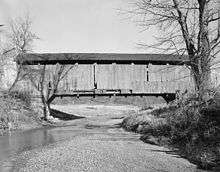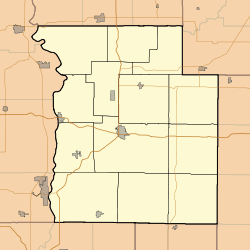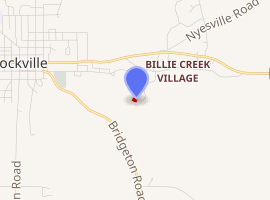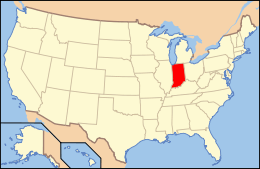Leatherwood Station Covered Bridge
The Leatherwood Station Covered Bridge is a single span double Burr Arch Truss covered bridge structure that was built by Joseph A. Britton & Son in 1899. Originally it had sandstone abutments but when it was moved to Billie Creek Village they were replaced with concrete abutments with sandstone showing.[4][5]
Leatherwood Station Covered Bridge | |
|---|---|
 | |
| Coordinates | 39°45′27.58″N 87°12′33.05″W |
| Carries | Walking trail |
| Crosses | Williams Creek (Indiana) |
| Locale | Rockport, Parke, Indiana, United States |
| Official name | Leatherwood Station Covered Bridge |
| Other name(s) | Harry Wolf Bridge |
| Named for | Leatherwood Station |
| Maintained by | Parke County Commissioners Parke County |
| WGCB # | 14-61-25[1] |
| Characteristics | |
| Design | Burr arch truss bridge[2] |
| Total length | 72 ft (21.9 m) (includes 9 ft (2.7 m) overhangs on each end) |
| Width | 16 ft (4.9 m) |
| No. of spans | 1 |
| Clearance above | 14 ft (4.3 m) |
| History | |
| Construction cost | <$680 |
Leatherwood Station Covered Bridge (#25) | |
 Location of Leatherwood Station Covered Bridge  Location of Leatherwood Station Covered Bridge  Location of Leatherwood Station Covered Bridge | |
| Built | 1899 |
| Built by | Joseph A. Britton |
| Website | Leatherwood Station Bridge |
| Part of | Parke County Covered Bridges TR (ID64000193) |
| NRHP reference No. | 78000397 [3] |
| Added to NRHP | December 22, 1978 |

| |
History
The bridge was named after the nearby B&O Railroad station at its original location (39.815141°N 87.299085°W). It was also known as the "Harry Wolf Bridge." Wolf owned the land near the bridge. The portal was later modified into a J. J. Daniels Arch while the original angular Britton Arch framing is still visible from the inside.
A letter from J. J. Daniels dated May 18, 1899, says that he had made a bid to build the bridge for $680. Since J. A. Britton was awarded the contract it can be assumed that his bid was less than Daniels.[6]
According to Historic American Engineering Record documentation of the bridge, it was repaired in 1940 by the Works Progress Administration. It was built by Britton who built approximately 40 bridges in three Indiana counties, Parke, Putnam, and Vermillion, during a 33-year period.[7]
It was added to the National Register of Historic Places in 1978.[3]
Gallery
Images of Leatherwood Station Covered Bridge prior to being moved to Billie Creek Village.
|
See also
- List of bridges documented by the Historic American Engineering Record in Indiana
- List of Registered Historic Places in Indiana
- Parke County Covered Bridges
- Parke County Covered Bridge Festival
References
- http://www.indianacrossings.org/bridgeLinks/14-61-25.html
- "Leatherwood Station Covered Bridge (#25)". Parke County Convention & Visitors Commission. Retrieved 24 March 2020.
- "National Register Information System – Leatherwood Station Bridge (#25) (#78000397)". National Register of Historic Places. National Park Service. January 23, 2007. Retrieved March 24, 2020.
- "Leatherwood Station Covered Bridge (#25)". Parke County Incorporated / Parke County Convention and Visitors Commission. Retrieved 21 September 2016.
- "Indiana State Historic Architectural and Archaeological Research Database (SHAARD)" (Searchable database). Department of Natural Resources, Division of Historic Preservation and Archaeology. Retrieved 2016-06-01. Note: This includes Charles Felkner (December 1977). "National Register of Historic Places Inventory Nomination Form: Parke County Covered Bridge Historic District" (PDF). Retrieved 2016-06-01., Site map, and Accompanying photographs.
- http://www.indianacrossings.org/bridgeLinks/14-61-25.html
- John M. Kelly. "Leatherwood Station Covered Bridge". Historic American Engineering Record.
External links
| Wikimedia Commons has media related to Leatherwood Station Covered Bridge. |
- Official website
- Historic American Engineering Record (HAER) No. IN-40, "Leatherwood Station Covered Bridge, Spanning Leatherwood Creek (moved to Billie Creek Village), Montezuma, Parke County, IN", 15 photos, 8 data pages, 2 photo caption pages
- Parke County Covered Bridge Festival

